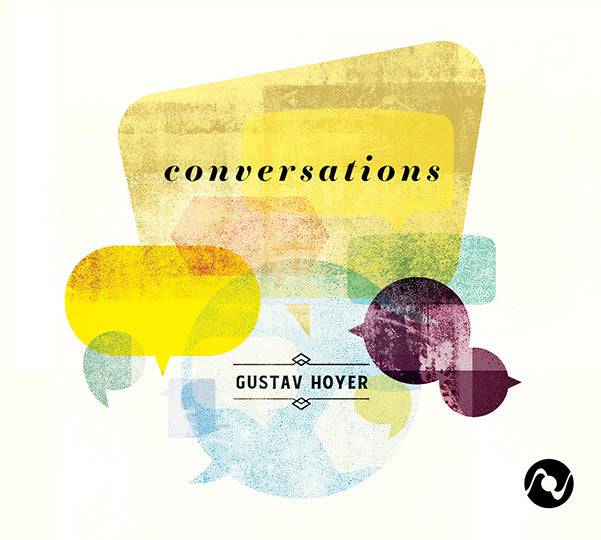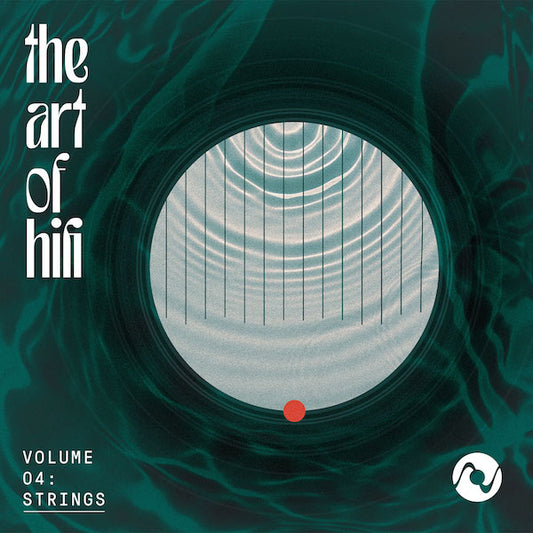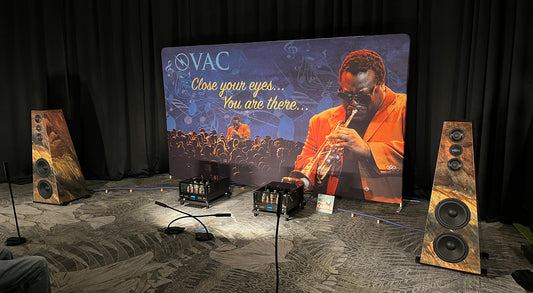Octave Records is proud to announce the release of Conversations by composer, pianist and conductor Gustav Hoyer, an album of new works that combine classical music inspirations with contemporary influences. Hoyer has written numerous albums and film scores and is the founder of The Orchestra Unleashed, which combines orchestral and multimedia performances.
Conversations features compositions that were written specifically for Octave Records and the awareness that Octave had the ability to present the musicians and performances with extraordinary sonic realism. “The spatiality of classical music is, I think, well-suited to the high-end audiophile listening experience,” Hoyer noted. “I wrote music to try and create a really interesting sound field so that listeners could appreciate the physicality of the music-making and classical music.”
The musicians include Gustav Hoyer and Benjamin Harding on piano, Julia Taylor and Joy Yamaguchi on violin, and Allyson Stibbards (viola), Sophie Stubbs (cello), Alisa Bruntz (flute) and Kwami Barnett (clarinet). The album was recorded using Octave Records’ latest Pure DSD 256 process, featuring the Merging Technologies Pyramix recording system. Conversations conveys the tonal shadings, harmonic richness, and dynamic nuances of the music with remarkable realism and texture, with the instruments presented on an intimate yet spacious soundstage.
Conversations was recorded by Paul McGowan and mixed by McGowan, Gustav Hoyer and Gabriel Hoyer, and mastered by Gus Skinas. The album features Octave’s premium gold disc formulation, and the disc is playable on any SACD, CD, DVD, or Blu-ray player. It also has a high-resolution DSD layer that is accessible by using any SACD player or a PS Audio SACD transport. In addition, the master DSD and PCM files are available for purchase and download, including DSD 256, DSD 128, DSD 64, and DSDDirect Mastered 352.8 kHz/24-bit, 176.2 kHz/24-bit, 88.2 kHz/24-bit, and 44.1 kHz/24-bit PCM. (SRP: $19 – $39, depending on format.)
The album opens with the four-part Conversations suite for piano and string quartet, in tribute to the classical tradition of having four movements in a symphony. The bracing “…a note on parchment…” is followed by the playful “…a daguerreotype of a rainy afternoon…,” the dreamlike and almost wistful “a father’s wristwatch…,” and the energetic ensemble playing and harmonic movement of “…a tattered facemask….” The solo piano piece “Sonatina” and piano and clarinet duo “Ballade” showcase Hoyer’s sensitive yet incisive touch, and the way his melodies organically unfold. The music becomes more deeply involving with each listen. As Gustav Hoyer points out, “There’s a lot of musical conversation going on. The main melody is your main character. But there are layers of supporting characters that are having conversations with each other.”
I talked with Gustav Hoyer about the album…and we wound up having quite a conversation ourselves.
Frank Doris: Had the music on Conversations been percolating in your head for years, or is it recent?
Gustav Hoyer: Only one of the pieces was already existing, “Tears.” I wrote that in 2011 when my father passed away. But I knew that it had spatial characteristics that would suit this album. And then I wrote all the other music to try and create a really interesting sound field so that people with high-end [audio] experience could appreciate the physicality of the music making and [of] classical music. The spatial physicality of classical music is, I think, well-suited to the audiophile experience.

Gustav Hoyer.
FD: Yes. For decades people have been raving about the 1950s and 1960s Mercury, RCA, and Decca classical recordings. They can be on two levels. You have the large-scale symphony orchestra experience, which is interesting because sometimes audiophiles get obsessed about imaging and things like that, and you don't really hear that kind of precise imaging in a real-life symphony orchestra. In the hall, though, you do hear a huge sense of depth and space. And then you have, say, a string quartet or small ensemble where the sound is more intimate and close-up. it’s interesting that you wrote the music and were aware of the fact that it would have a spatial aspect to it and a good recording and system would reproduce that. I have to think with a lot of composers, that aspect of it might be the last thing (laughs) they would think about.
GH: What was intriguing to me is that the high-end audiophile is a disciplined, attentive listener. That is every composer's dream because music is so ubiquitous and it's superficially produced almost everywhere in our society now. And it has devalued the art of it in some ways, because it is so common and ubiquitous. And to me, this [opportunity to record with Octave Records] was a really neat invitation into the listening rooms of people who care deeply about sound. And so I took it as a privilege to create music that would reward close listening. You mentioned symphonic versus chamber music [sound], and you're right, in a live performance, a symphonic sound field, it blurs. That's part of the beauty and the power of it. But it becomes this very blurred tapestry because you're remote from the stage.
You don't hear the spatial positioning of instruments very well just because of the distance and the size of the halls. But with chamber music, what I wanted to do with this recording, I wanted to take the listener and put them right in the middle of the quartet. One of the greatest experiences I have [as a musician on stage] is hearing all the music around me and the way the parts interlock and are in dialogue with each other. That's partly what makes the classical tradition so interesting and inspiring. [The music] is a conversation, and that led to the title of the recording, that you are listening to a conversation among friends and you're in the middle of it. You're not at a remove from it.
FD: That really comes through. I sort of don't know how to describe the music. I'm more knowledgeable in jazz and pop, though I've been listening to classical my whole life. But Conversations has a timeless as well as a modern quality to it. Did you have any kind of conscious approach to the album or did you just write what you felt?
GH: My training is in the classical tradition, and it [has] a lot of conventions to it. But I have, as a classical composer, a double challenge because the genre is very specialized just right at the get-go. And then the vast majority of the genre is filled by the masters who are long-dead. They are the ones who laid the vocabulary down. In my training, my composition instructors said, you're very odd because you're writing music that's got a modern flavor, but it's like you're writing a modern play with Shakespeare's English.
And that's really what I mean; my music is of our time, it's of our experience. It's inspired by things in my own life, but I'm using a vocabulary that's a little bit older. It's interesting that you would say it is a little peculiar that way. It is classically-inspired for sure. “Conversations” pays homage to the masters. There's an inspiration for each of the movements. And there's a little bit of a riddle. The movements are titled with a little bit of a riddle to figure out which classical master [and] which time period they’re associated with. So the four movements actually go from about 1820 to about now in terms of which composers I'm stylistically drawing on in that particular piece. The modern one is the fourth movement. It's [representative of] our own time.
FD: Well, that kind of leads me to the inevitable question of, who are your influences and who do you admire the most?
GH: I am as much a product of modernity as anyone. I grew up on pop music, but when I discovered classical music and the masters [of classical music composition] and the way they approach writing music, it's different than popular music. A particular [composer who resonates with me] has been Rachmaninoff; very passionate and deep. And there's a dark, a bittersweet element. Dvořák is a favorite because his music's got a slightly folk-inspired [influence]; it's Czech-inspired, but it's just masterfully crafted. Schubert's music is delightful. But of my absolute inspirations, [they’re] probably twofold. Brahms and Tchaikovsky, and they're very different compositionally. Those [composers] inform a lot of my vocabulary, and I bring that to this album. There are echoes of Vaughn Williams in the clarinet piece.
FD: Everybody's a product of their influences.
A lot of modern music that I've heard sounds like it’s willfully dissonant or avant-garde or written for highfalutin critics, and the composers are just going to write some stuff that's just so out there, or dissonant, or maybe even unlistenable because that's the hip thing to do. Like a lot of modern art. You look at it and think, is this art, or is this utter crap? Is the artist trying to pull something? Is it a total fraud? But I most refreshingly did not get that sense in your music. You know, it sounds like music.
GH: Well, it's interesting you touch on that. Early on in my training, I was trained at a time when you still had to do serialism, like Schoenberg. Some of the things you describe, they're very, very difficult to listen to. They're difficult to write, they're difficult to listen to and to play. I was trained that that was kind of the expectation. And I really took a different road. I always felt like, my job, if I'm an artist, I'm in service of other people. And if I write stuff that is deliberately hostile to inviting people into the experience, I'm just serving my own vanity.
The art doesn't matter if people can't encounter it and they can't make some foothold in it and engage [with] it if it can't meet people where they're at. [Then] I'm just being arrogant and indifferent. I've written some incredibly intricate…I mean, I know how to write that stuff. I just don't want to; I've never wanted to. So I appreciate you noting that, because it's actually a big part of my inspiration that I deliberately avoid [music like] that.
FD: As a lot of musicians get older – when you're young, you're full of adrenaline and you want to conquer the world. As a young rock guitar player, you go out there with the attitude of, I'm gonna play as many notes as I can and wow people. And when people get older, they say no to all that, and they get simpler. Now they want to play like Miles Davis or Bill Evans, not in a more complex style like Oscar Peterson or Art Tatum. You know, less is more. Do you find that that's something that you're conscious of?
GH: Yeah, it's really insightful, Frank. Your musicality shows with that question. As a young person, it was about the density of ideas that I could put in some of my earliest works, (which aren’t even available on recordings). [They} are so idea-dense. And then I realized the listener couldn't possibly hope to engage [with] all of that. If my intent is to bring people into an experience, I need to make space. Because as you know, as a musician, you practice a phrase so many times or music so many times [that] you have a chance to absorb it through a thousand listenings. But a listener doesn't get that opportunity and you have to meet them on their first or second hearing with their ability to comprehend it.
And I think that, of necessity, then says, no, there needs to be space. And it's serving the listener to give them space. And this is the thing that I think, as I've gotten older, appreciate – do I know what I really intend to convey? Because another way that you can avoid the accountability for saying something vulnerable or profound is you crowd it with so [many] ideas that you're hiding behind your own content.
I think the journey of maturity as an artist is to be more vulnerable, more naked in some sense. And it takes courage and confidence to say, I'm going to state something simply and run the risk of it being rejected because it's so easily understood. I'm not gonna confuse [listeners] anymore. I'm gonna let it sit there and be what it is.
FD: That's quite a group of thoughts. You're the second person I’ve ever encountered who’s mentioned the concept of “idea density.” I remember seeing that phrase in a review by Robert Christgau of Blue Öyster Cult in something like 1975. And he mentioned their guitarist, Donald Roeser (aka Buck Dharma), as having an idea density that most guitarists couldn't touch. So, you are literally the second person in my entire existence of 60-some-odd years on planet Earth who has used the concept of idea density.
GH: Wow. (laughs) Well, interesting. I think it speaks to what you're describing, which is why musicians who mature, simplify.
FD: Octave Records issued a recording of Zuill Bailey doing the Bach Cello Suites.
GH: Oh, he's so…
FD: Amazing. He had said that he had done them for Telarc, maybe 15, 20 years earlier. And he thought, why am I doing them again? Part of the reason is that his whole approach to not only music but life had changed. And he said he felt like he wanted to get more to the core, to the essence of them. He was a different person, and as a result, he was a different player and he approached the Bach Cello Suites differently.
GH: It's exquisite. Yeah. Exquisite. He's just a fine, such a fine musician.
FD: What were the ideas or inspirations behind some of the songs? Why are the first four pieces on the album a suite?
GH: The first four tracks are grouped; it's a convention in classical music. Before there were [recorded] albums, that [was the] idea of an “album.” Usually composers like symphonies and quartets; they come in multiple movements. That first group [of] four pieces is really one creative concept [using] the same instrumentation, a piano quintet. The conventional movements would be fast, slow, fast, fast, or some combination of that. So, I'm paying respect to the tradition I draw on.
I wrote [the pieces] with this partnership with Octave Records in mind [in terms of the sonic presentation]. How [can] I create something [where] an attentive listener will be rewarded? They'll get to follow the plotlines of the different instruments and hear how they're in [a] dialogue. So, you can sit back and get this kind of tapestry of sounds and chords. But if you listen [to it as] an audiophile experience, you'll hear the [musical] lines hand off between instruments. It's in the accompaniment, it's subtle, it's layers down, not on the surface. There’s a lot of conversation that's sotto voce or, or quiet voice that's underneath the main line.
[In making the record] we thought, well, let's start acoustically. And I worked with Jessica (Octave Records producer Jessica Carson) to bounce some different ideas, and I said, I think [Conversations] should go first because it's the most massive of the sounds. And then you move through the string quartet kind of traditional chamber [music] into other sorts of groupings, like “Tears,” that includes flute and clarinet, and more intimate piano solo work. “Wedding Prayer” is a quartet version of an a cappella piece for voices that I wrote at my wedding.
For “Ballade,” a gentleman I know, Kwami Barnett, is an outstanding clarinet player. [I wanted to] explore the depth of the clarinet sound, its range. The clarinet’s got three ranges: chalumeau (low), clarion (middle) and altissimo (high). A clarinet has three timbres in it, depending on where it plays. The pianistic accompaniment is designed to just be a partner, not the support, not just simple chords, but it's a conversation again.
FD: How did you meet the musicians? Have you been working with them for a while, or not at all, or somewhere in between?
GH: Somewhere in between. I specifically engaged players who would be able to be at [Octave’s] studios in Colorado. It was not practical to bring some of my prior collaborators. So the quartet was new, but pianist Benjamin Harding is a good friend of mine. Kwame Barnett is a friend of mine here in Colorado.
FD: is there anything you want to add?
GH: I really, really crafted this to try and serve this particular community of listeners who value music at this level. As a creator, I really appreciate the people who take this art seriously. I'm grateful for them. I'm grateful for this chance to bring some music. It's a privilege for me.



